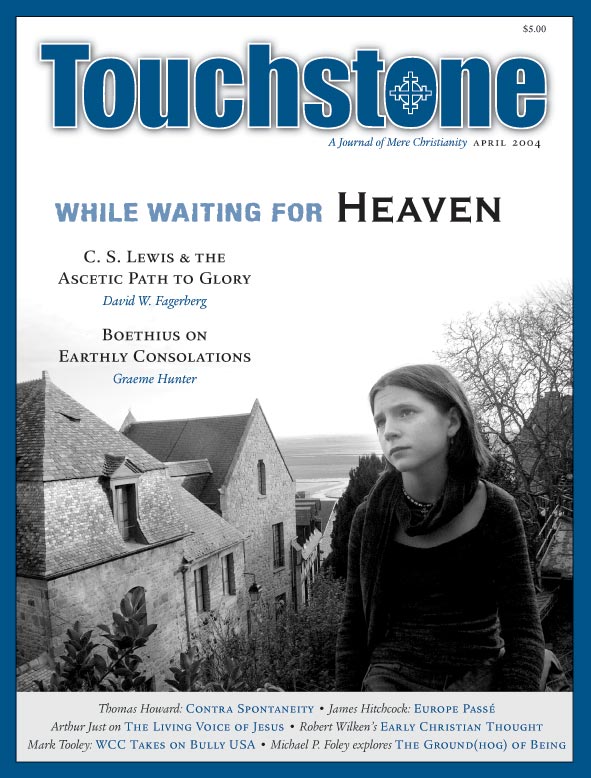Boethius’s Complaint
Can the Christian Find Consolation Without Christ?
by Graeme Hunter
One really priceless ornament in the long, and seldom distinguished, history of self-help literature is Boethius’s Consolation of Philosophy. It shows what can happen when terrible misfortune collides with human integrity. The fact that its author was a Christian ought to have been a special blessing to fellow believers in the centuries since it was written (about 524). But it has really been more like a worry. The Consolation is unaccountably silent about Christ. Though summoned to seriousness by his own impending execution, Boethius writes as if he were a pagan and appears to derive no solace from his Christian faith.
Secular scholars notice the puzzle without emotion. They usually account for it by saying that Boethius, though a nominal Christian, must have been pagan at heart.
Not surprisingly, Christians have been slow to agree. We want an excuse for appreciating Boethius’s great work. And we don’t want to believe that paganism has powers of consolation denied to Christianity. Yet our attempts to explain what made Boethius silent about his faith have not been impressive. Conjectures about the Consolation’s being an early work, or maybe just an academic exercise, or a deliberate abstention from theology in order to avoid giving theological offense are not really very plausible.
I think there is another explanation. Not only is much of the Consolation structured around medical metaphors for the life of the soul, but an original conception of medicine lies at the heart of its perennial appeal, and explains how a Christian in extremis might have felt compelled to write a work that did not draw in any clear way on his Christian faith.
The Man
Boethius was born in Rome around 480. His patrician Roman family had been Christian since the days of the emperor Constantine 150 years before, but he did not take his faith for granted. He contributed to its development, vigorously contesting some of the disputed theological questions of his day. Among the theological writings usually attributed to him is a skilful summary of Christian belief called On the Catholic Faith.
In his own eyes, however, Boethius was not primarily a theologian, but a scholar of ancient philosophy. Platonism is at the heart of his thinking, but it is the key to more that just his intellectual outlook. It had the ironic double effect of abbreviating his earthly life while assuring his literary immortality.
His commitment to Platonism launched him on the political career that proved to be his downfall. Politics degenerates unless good men do their part, Plato said, so Boethius overcame his reluctance to hold office and served Rome with great distinction for more than two decades. He rose to be Consul of Rome in 510 and then in 522 was appointed to Rome’s highest civil service position, that of chief administrative officer, or Magister Officiorum, of the Western Empire. In that position he was next in power only to the ruler, Theodoric.
Then, as in some archetypal tragedy, suddenly and irrevocably, he fell. A year after attaining the height of Roman power he was charged with treason, and before another year had passed was brutally put to death.
How did Boethius fall so quickly from grace? The records are sketchy, but the story is roughly this: Theodoric’s position as ruler of the Western Empire became precarious when the new emperor, Justin, brought Constantinople back under the ecclesiastical authority of Rome, which he did within a year of taking power in 518. But the return to orthodoxy of one half of the empire spawned political confusion in the whole. With the emperor in Constantinople now part of the Roman fold, Theodoric was suddenly vulnerable. For though he ruled from Rome, he was not in communion with her Church. He tolerated orthodox Christianity but himself remained an Arian. The seamless weft of religion and politics in that period meant that religious developments could marginalize even a powerful ruler like Theodoric.
Just at that time letters addressed to Emperor Justin from several Roman Senators were intercepted and alleged to be treasonous. The letters were read as suggesting that perhaps the Roman people, or certainly the Roman Senate, would more willingly be ruled by the orthodox Justin than by the Arian Theodoric. As Magister Officiorum, Boethius could not avoid taking a position on these letters, but he might have chosen a more prudent one. He affronted his sovereign by making what he thought was a high-minded defense both of the individuals who had been accused and of the Senate as a whole.
Perhaps Boethius knew the risk he ran of being linked to a traitorous conspiracy against Theodoric. If so, he must have considered the Senate worth risking his life for. Or maybe he was simply naive. In any case he never admits that anyone could reasonably have construed his actions as treason. Instead he holds himself up as a victim of injustice and misunderstanding:
Do you know what, in a word, was the charge against me? That I wanted to preserve the Senate. And how did I do that? I am charged with preventing those accusers from bringing forward proofs whereby the Senate might have been convicted of treason. . . . I did want the Senate to be preserved, nor shall I ever cease to want it so.
Theodoric, unfortunately, saw things differently. He dropped Boethius from the height of power into the depth of an imperial prison, and then, a year later, sent him to an appalling death. The executioner put a rope around his forehead and tightened it until his victim’s eyes bulged from their sockets. Next he cracked the skull like an eggshell.
The Consolation
In prison Platonism worked its second great effect on Boethius. By its light he composed the highly literary yet autobiographical Consolation of Philosophy, from which his literary immortality derives. Weaving myth into realistic narrative, he depicts himself as in prison but surrounded by the Muses as his comforters. They caress him with poetry and song but have no remedy for his deadly ailment.
That is when Philosophy appears in the form of a goddess with healing in her wings. After noting the “fading light” in Boethius’s eyes, she reveals at once the medical nature of her mission: Medicinae tempus est (“It is time for medicine”) are her first words. Henceforward, as she diagnoses, treats, and heals her patient, so we pass from section to section of the book.
“He suffers from lethargy,” Philosophy says in diagnosing him, “an illness common to distracted minds.” Lethargy (Latin lethargus) had a more precise meaning in ancient times than it has today. Nowadays we think of it as a kind of fatigue symptomatic of different minor ailments. To the ancients it was a serious disease. The medical writers of antiquity considered lethargy a pathological desire for sleep, usually accompanied by fever and often by delirium, languor, loss of speech, loss of feeling, and immobility. An eminent Roman physician contemporary with Boethius informs us that lethargy is a species of phrenitis, or brain-fever, which if untreated could result in death.
Boethius’s account of lethargy is not merely a case of a writer casually adopting a medical image. He reconfigures the physical symptoms associated with lethargy as mental problems. Dame Philosophy’s subsequent cure is also a healing of the mind, in which only the rational and emotional faculties are treated. But an illness that is both diagnosed and treated as a mental disorder belongs in the realm of psychiatry. The Consolation, then, is an essay in psychiatry, and Boethius is one of its pioneers.
The narrator depicts himself as a textbook lethargic. In the first place, he is “stupefied,” incapable even of speech. His wordlessness stands as an evocative symbol for his inability to answer the great question before him: How shall I confront my imminent death? It also wins over his readers. Boethius faces with dramatic suddenness a question each of us will have to face, perhaps no less abruptly. Dame Philosophy’s cure, when it comes, will therefore be a light in every man’s darkness.
Some of what appear to be only literary devices turn out to have medical significance as well. Boethius’s initial failure to recognize Dame Philosophy reflects the incapacity of lethargics to recognize faces, a condition noted in the ancient literature on lethargy. Once again, however, it points to a purely mental failing. It shows Boethius to be like many well-educated people: Their humanistic training proves insufficient for life’s greatest trials. Philosophy may be with them, but she goes unrecognized.
The philosophical physician completes her assessment of Boethius’s true situation at a glance, even before hearing the long, self-justifying grievance that constitutes his opening complaint. He is then nevertheless permitted to explain the nature of the charges that have been brought against him, and rail at the wickedness of those who have brought them, and the injustice of their claims: “I am deprived of all my goods and stripped of my honors. The object of evil gossip, I am punished for my good service.”
Fortune’s Downside
In his own eyes, Boethius is a tragic figure, destroyed by what the ancients called bad fortune. Tragedy is ancient poetry’s greatest gift for understanding the human condition. It concerns lives on the downside of fortune’s wheel, those who suffered from ill fortune (what we call contingency) or fate. Some tragedies depicted those who suffered ill fortune, like Oedipus, who plunges his kingdom into chaos, destroys his family, and ends up blind because of mistakes he could hardly have avoided making. Others depicted those who suffered from the decrees of fate, like Oedipus’s daughter Antigone, who loses her status, her lover, and her life for the sake not of some vice but for a virtue.
Boethius saw himself as a real-life tragic figure: a noble man, crushed by forces larger than himself for faults that are either non-existent or, at worst, tiny in comparison to the punishment he suffers. Dame Philosophy rejects this assessment, however, but not because she thinks it self-indulgent or pretentious.
Boethius was not wrong to try on the tragic buskin, which fits him perfectly. The fault lies with tragedy itself. Drama of that type simply does not grasp life deeply enough to give a full account of it. The true motor of events is not chance. There is an ordering power unaffected by fortune’s spinning wheel and, in the final analysis, it is good. All human lives, including the sad and tragic ones, are in reality part of a divine comedy.
Comedy is, of course, also a form of drama, which includes not only that which makes us laugh but all drama that affirms the ultimate goodness of life. To assert a comic vision of life, as Dame Philosophy does, is not to endorse some silly optimism, though it may sound a little like it. Her view derives from a deeper source, from Plato’s morally optimistic alternative to Sophoclean tragedy. No matter how discouraging life may seem to be, Plato thought, cosmic justice ultimately prevails. Evil never prospers; good is everywhere triumphant; there is always a just distribution of punishment and reward.
Socrates articulated what I call the comic vision of life in his mild rebuke to those who sentenced him to death: “You must be of good hope regarding death, gentlemen of the jury, and keep this one truth in mind, that a good man cannot be harmed in life or in death, and his affairs are not neglected by the gods.” Dame Philosophy’s cure for Boethius consists mainly in winning her patient (and the Consolation’s readers) over to this comic conception of life.
But Boethius has in addition a wider complaint, a question often raised and seldom answered. Don’t the contingencies of life demonstrate a flaw in the whole God-given order of things? The ill fortune that has befallen Boethius could as easily happen to any of us without regard to our merit. How can contingency of that magnitude inhabit the creation of a just and caring God? “It is surely,” Boethius wrote, “a monstrous thing in the sight of God that whatever plot an evil man hatches against the innocent he is actually permitted to carry out. It was not without reason that one of the philosophers asked: ‘If there is a God, whence comes evil? But whence comes good, if there is not?’”
The Dame’s Care
Troublesome questions these, weightier than the world. They are too serious for most of us even to take seriously. Can anyone who has read Job expect to make sense of tragic lives? Is it not a scandal to put God’s existence in question, and blasphemous to wonder whether he himself could be evil? Pious people tend to put such questions aside, as do pretentious people who wish to appear to know the answers. It is really only theologians and philosophers and innocent stricken people who take them seriously. Unluckily for Boethius, he was all these things. Luckily for everyone, he found answers.
One by one Dame Philosophy presents her medical remedies for Boethius’s intellectual ailments. First, she shows him why the tragic vision distorts his understanding of life. We have no natural entitlement to such things as wealth, honors, titles, spouses, children, or estates. Where, then, is the injury when fortune, who bestowed them, takes them back again? With life-changing simplicity she makes him see that wealth brings no lasting security, that high office confers no effective power, and that fame does not really make anyone known.
She then proves to him that ill fortune is, if anything, preferable to good fortune, because it is honest, and because it brings to light our true friends. Fortune bears us no ill will, and there is a limit to the harm it can do. It may sweep us along like leaves on a gusty day, but it affects only those parts of us that are in any case subject to decay and death. As Socrates said to his accusers, “It is not as if I would have lived forever, had you not sentenced me to death.”
But if we are not entirely subject to contingency, neither are we wholly vulnerable to tragedy’s other famous weapon: fate. Dame Philosophy shows Boethius that divine providence charts its untroubled course between contingency and fate, yet without any injury to human freedom. “As reasoning is to understanding, as that which becomes is to that which is, as time is to eternity, as the circle is to its center, so is the moving course of fate to the unmoving simplicity of providence.”
Dame Philosophy concludes the Consolation with this comforting exhortation:
Thus our hopes are not vainly placed in God; nor are our prayers, which, when they are right, must always be effectual. Turn away then from vices. Cultivate virtues. Lift up your mind to righteous hopes; offer up humble prayers to heaven. The great necessity before you is that of doing good, unless you deliberately deceive yourself, when you act before the eyes of the all-seeing judge.
Coping versus Hoping
Boethius’s diseased mind may be cured by philosophy’s remedies, but Christian readers still have unanswered questions. Why, in all this discussion of evil, is no mention made of the Fall? Why does Boethius talk of persecuted virtue without reference to its archetype, the trial and death of Jesus Christ? And how can a Christian writer discuss consolation without even a mention of the Cross or the Resurrection?
The omissions are not due to ignorance. Boethius’s tract On the Catholic Faith summarizes the main articles of Christian belief in a form that could be called “mere Christianity” for academics. Yet the tract has a strangeness of its own. It makes no mention of consolation. Though it acknowledges that present evils will be outweighed by post-resurrection happiness, it offers no insight about how to cope in the terrible interval while suffering drags on. So here are two mysteries in place of one: No Christianity in Boethius’s Consolation; no consolation in his Christianity.
The reasons proposed by scholars for Boethius’s apparent paganism were unconvincing even when applied only to the first of these problems. They have nothing to say about the second. But what if Boethius, without denying his faith, thought it had nothing to do with consolation? Could any Christian consistently believe that? The medical dimension of the Consolation shows how one just might.
It is obvious, in fact, that most modern Christians believe something along these lines when it comes to physical healing. Think, for example, of how many there must have been among the last few generations of Christians who, without ever doubting that Jesus is the great healer, nevertheless rejoiced that there were also effective antibiotics and painkillers to deal with their physical ailments and sufferings. And most of us would know how to justify our attitude. The physician’s natural techniques and pharmacopoeia are among God’s healing gifts, we would say, and should be gratefully received.
One of the revelations vouchsafed to the West is that the causal order is stable (like Dame Philosophy’s fate) and can be exploited for good (like her providence). Causal stability is what makes Western medicine a science.
Prayer is an important factor in healing too, we concede, but in practice, medicine is the first line of attack. To modern eyes a medical doctor who neglected scientific medicine in favor of even the most fervent prayer would be more of a shaman than a doctor, however holy he might be. There is nothing objectionable, however, about a doctor who neglects prayer in favor of medicine. We modern Christians are skilled in justifying our growing dependence on successful medicine. Any furtive concern about how medical improvements squeeze out God we prefer to leave for another day.
Now suppose that when all the props of Boethius’s comfortable and faithful life were kicked away, he came to see intellectual sickness as we see the physical. What if the idea occurred to him that there might be a reliable treatment for the mental lethargy from which he suffered? Perhaps in his condition he found the hope of the Resurrection, great though it is, not the only comfort available nor the most effective one. Perhaps he guessed there could be a purely human science of consolation.
If that is so, then the place for it is in that tract of time—sometimes an extended one—that lies between the death sentence and the execution. And if there, then it also belongs between the diagnosis of terminal illness and the day of our death, between the declaration of war and the explosion in the street. The science of consolation, if there is one, is for everyone for whom the bell tolls. The interval of anxiety may be brief when viewed from eternity, but long for us. And while we linger alive, but doomed, the hope of Resurrection may not always be enough to enable us to cope with our suffering.
Real Questions
Is it unreasonable to think that psychiatric science could be our best guide to those unhappy days? Is it disloyal to Christ to hope it may be so for those, like Boethius, whose normal lives are undone by ill fortune? These are real questions to me, for which I can find no satisfactory answer.
There is no reason to believe that Boethius disparaged Christian hope, much less that he rejected it. He likely turned to pagan literature for something else. What he needed in the short term was not a far-off hope, but a present way of coping, a way to face what the seventeenth-century English poet Henry Vaughan called the “heap of dark days.” If medication is providence’s remedy for the body, then psychiatry may be its gift for the mind. The Consolation will never lose its appeal because it offers readers a way to cope.
And yet I hesitate. Sensible as they are, these reasons for thinking medicine our ally sometimes seem more like rationalizations. Not that any Christian should accept the anti-medical fantasies of Christian Scientists or Jehovah’s Witnesses. Yet even if most Christians have made their peace with physical medicine, the same does not seem to apply to psychiatry. Many still suspect psychiatrists of usurping functions that properly belong to clergymen. And few of us have a convincing answer to a simple question: If medicine and psychiatry were both perfected, what role would God play in our lives?
Great philosophical texts always put the reader in question. The Consolation does no less. Its use of medical images may explain the enigma of Boethius’s faith, but only by making a paradox of ours. If Boethius found he could not live without medicine, he challenges us to live with it and yet preserve our faith.
This article is drawn from a lecture given at the 2003 conference of the Christian Medical and Dental Association at Augustine College in Ottawa. The author is indebted to Drs. Joy Albuquerque and Dorian Peshauer for helpful insights on psychiatric matters.
Graeme Hunter is a contributing editor to Touchstone and Research Professor of Philosophy at Dominican University College in Ottawa. He is the author of Radical Protestantism in Spinoza's Thought (Ashgate).
subscription options
Order
Print/Online Subscription

Get six issues (one year) of Touchstone PLUS full online access including pdf downloads for only $39.95. That's only $3.34 per month!
Order
Online Only
Subscription

Get a one-year full-access subscription to the Touchstone online archives for only $19.95. That's only $1.66 per month!
bulk subscriptions
Order Touchstone subscriptions in bulk and save $10 per sub! Each subscription includes 6 issues of Touchstone plus full online access to touchstonemag.com—including archives, videos, and pdf downloads of recent issues for only $29.95 each! Great for churches or study groups.
Transactions will be processed on a secure server.
more from the online archives

33.1—January/February 2020
Do You Know Your Child’s Doctor?
The Politicization of Pediatrics in America by Alexander F. C. Webster
calling all readers
Please Donate
"There are magazines worth reading but few worth saving . . . Touchstone is just such a magazine."
—Alice von Hildebrand
"Here we do not concede one square millimeter of territory to falsehood, folly, contemporary sentimentality, or fashion. We speak the truth, and let God be our judge. . . . Touchstone is the one committedly Christian conservative journal."
—Anthony Esolen, Touchstone senior editor








